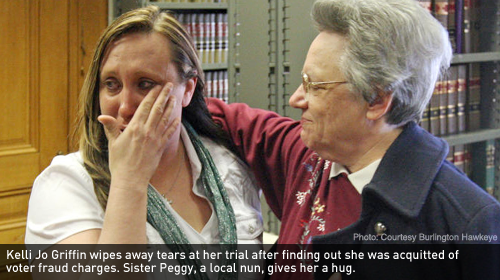
Mass incarceration not only destroys families and mangles communities, it slowly erodes our democracy. Too many Americans convicted of nonviolent offenses, such as drug crimes, are punished with excessive prison sentences and then permanently ejected from our democracy through the ‚Äúcivil death‚ÄĚ of losing their right to vote.
Criminal disenfranchisement removes massive swaths of society from the democratic process as a collateral consequence of conviction. A striking 5.85 million Americans can’t vote because of a criminal conviction. If all of these citizens populated their own state, it would be the 20th largest state in the country and would have ten votes in the Electoral College.
The distortion of democracy operates through a patchwork of state disenfranchisement laws, varying in severity from state to state. Many disenfranchised citizens live in Iowa, Kentucky, or Florida ‚Äď the three states with extreme policies of disenfranchising anyone with a felony conviction for life.
These states are among those that also disproportionately suppress the voting rights of African Americans. In both Florida and Kentucky, approximately one in five African-American citizens is disenfranchised due to a prior conviction. In Iowa, the long-standing system of disenfranchisement, paired with the worst disproportionate incarceration of African-Americans in the nation, resulted in the disenfranchisement of an estimated 1 in 4 voting age African-American men by 2005.
The ņŌįń√ŇŅ™ĹĪĹŠĻŻ and the ņŌįń√ŇŅ™ĹĪĹŠĻŻ of Iowa filed a lawsuit challenging Iowa‚Äôs extreme policy of disenfranchising for life everyone with a felony conviction. The Iowa Constitution specifically provides that citizens can be disenfranchised only for an ‚Äúinfamous crime.‚ÄĚ The meaning of the word ‚Äúinfamous‚ÄĚ in the mid-19th century meant ‚Äúmost vile; base; detestable.‚ÄĚ It captured a concept dating back to ancient Greece where ‚Äúcriminals who had committed certain heinous crimes were pronounced infamous.‚ÄĚ
Last year, in an Iowa Supreme Court case, a plurality‚ÄĒthree of six‚ÄĒ of the justices held that not all felonies are necessarily infamous crimes, but only those kinds of offenses that are serious and have some bearing on the integrity of elections.
In 2008, our client Kelli Jo Griffin pled guilty to a low-level drug crime, was sentenced to probation, and has since served her term of probation. Nonviolent crimes rooted in addiction are not ‚Äúmost vile,‚ÄĚ ‚Äúbase,‚ÄĚ or ‚Äúdetestable.‚ÄĚ They have no bearing on a person‚Äôs integrity, much less the integrity of elections. Once Kelli Jo and those like her have completed their sentences, we integrate them back into our society as neighbors, co-workers, and family members. There is no rational or constitutional basis for fencing them out from civic participation for the rest of their lives.
Once a citizen is disenfranchised, Iowa’s discretionary executive clemency policy is the only available route to restoration. But the clemency process is susceptible to the ebb and flow of politics, with some state governors restoring voting rights automatically, and others creating convoluted processes that prevent nearly all restoration.
In 2005, Gov. Tom Vilsack restored the right to vote to citizens who had already completed their sentence, resulting in an estimated 100,000 Iowans regaining their right to vote. He also set forth a process whereby citizens would have their rights restored automatically upon completion of their sentence. Automatic restoration remained in place at the time Kelli pled guilty to a non-violent drug crime.
But in 2011, before she finished her term of probation, Gov. Terry Branstad changed the system so that her rights were not automatically restored; a change Kelli was unaware of once she completed her probation.
Iowa‚Äôs extreme policy of punishing Kelli Jo with ‚Äúcivil death‚ÄĚ after she completed her probation and turned her life around is dead wrong. It violates the Iowa Constitution and disfigures our democracy.
Learn more about voter disfranchisement and other civil liberty issues: Sign up for breaking news alerts, , and .
